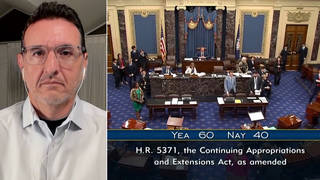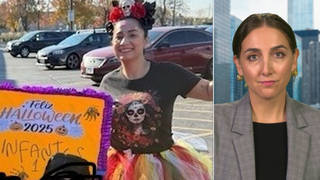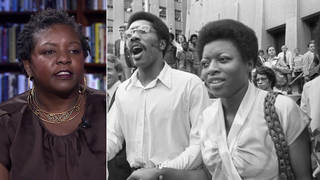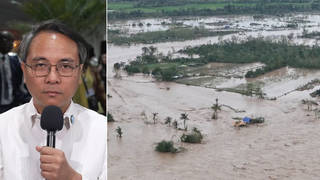
Guests
- Guillaume Longsenior research fellow at the Center for Economic and Policy Research, former minister of foreign affairs for Ecuador.
- Manuel RozentalColombian physician and activist, part of the group Pueblos en Camino, or People on the Path.
In recent weeks, the United States has conducted several deadly airstrikes on alleged drug boats in the Caribbean Sea, which the Trump administration has claimed, without providing evidence, were being used to traffic drugs. A group of United Nations experts said U.S. strikes targeting boats in the Caribbean off the coast of Venezuela amount to “extrajudicial executions.”
“There seems to be a much bigger political context behind this than really going after drug traffickers, which seems to be … not at all the main goal of the U.S. administration,” says Guillaume Long, senior research fellow at the Center for Economic and Policy Research and former foreign minister of Ecuador. Long says “regime change in Venezuela” and anger over Colombian President Gustavo Petro’s pro-Palestinian politics are also motivating factors in the U.S. campaign. Meanwhile, Manuel Rozental, a Colombian physician and activist, says the drug war is about economic control.
Transcript
AMY GOODMAN: This is Democracy Now!, democracynow.org. I’m Amy Goodman, with Juan González.
We’re continuing to look at the escalating tension between the U.S. and Colombia after the Colombian President Gustavo Petro condemned the U.S. for blowing up boats in the Caribbean. This week, on Truth Social, President Trump called Colombian President Petro an “illegal drug dealer.” He’s also called him a “lunatic,” speaking on Air Force One.
PRESIDENT DONALD TRUMP: You look at the fields. The fields are loaded up with drugs. And they refine the drugs, and they make tremendous amounts of cocaine. And they send it all over the world, and they destroy families. Now, Colombia is out of control, and now they have the worst president they’ve ever had. He’s a lunatic who’s got a lot of problems, mental problems.
AMY GOODMAN: Still with us is Ambassador Daniel García-Peña, Colombia’s ambassador to the U.S., who Petro just recalled as tensions rise between the U.S. and Colombia.
We’re also joined in Colombia by Manuel Rozental, Colombian physician and activist for 40 years of involvement in grassroots political organizing with youth, Indigenous communities, urban and rural social movements, been exiled several times for his political activities.
And we’re joined by Guillaume Long, Ecuador’s former foreign affairs minister, senior research fellow at the Center for Economic and Policy Research.
I wanted to go first to Guillaume Long in this segment, because in one of these latest bombings of a, what’s called a submersible, two people died, and then two people, a Colombian and an Ecuadorian, survived. The U.S. says they’re killing drug traffickers, but then they just released them. If you can explain what you understand happened and the significance of, overall, these bombings of boats, from Colombia to Venezuela?
GUILLAUME LONG: Thanks for having me on the show.
Well, I mean, there’s very little information. This is the whole point. And I think Ambassador García-Peña was very clear in saying that we do not have information. The United States has not provided information on who the people it’s bombing actually are. And in the case of the latest bombing you mentioned, including a Colombian and an Ecuadorian citizen, you know, there was no evidence provided that they were dealing in drugs, they were drug traffickers.
In fact, as you rightly said, the Ecuadorian citizen was returned to Ecuador, and Ecuadorian authorities did not prosecute that citizen, despite the fact that the Ecuadorian government is very close to the Trump administration. There’s a real political alliance between the Noboa administration in Ecuador and the Trump administration in the United States. In fact, even the prosecutor general in Ecuador has been seen and perceived as very close to the United States, as playing ball with the U.S. “war on drugs,” with now plans to reintroduce a U.S. military base in Ecuador, and so on and so forth. So, there isn’t the same political tension between Ecuador and the U.S. that you do see between Colombia and the U.S. But despite this, Ecuadorian authorities did not prosecute the Ecuadorian person that was handed over by U.S. authorities. So, you would think that if there’d been the slightest element of evidence, they would have — they would have really prosecuted that person, put them into jail, so on and so forth. So, there’s none of this.
And I think this speaks very loudly about what — the broader phenomenon that’s taken place in the southern Caribbean. It’s essentially a bombing campaign that’s for show. We haven’t been given any evidence of whether these boats that have been bombed are actually carrying drugs. We also know, I mean, the whole hypothesis of that coastline, particularly Colombia and Venezuela coastline, and particularly the Venezuelan coastline, the Caribbean coastline of Venezuela, being like the key conduit for the trafficking of drugs to the United States — that whole hypothesis has been largely debunked. The Trump administration has been speaking of the Cártel de los Soles, the Cartel of the Suns, which experts have, I think successfully and convincingly, argued is actually fictional, doesn’t exist, and certainly Venezuelan authorities are not at the head of that cartel. And we know that the bulk of the cocaine being trafficked into the United States is not leaving from that coast. It’s not leaving from Venezuela. Most of it is leaving from Pacific ports, particularly Pacific ports in Ecuador, but also probably Pacific ports in Colombia, but the bulk of it Pacific ports further down south, actually, in Ecuador and Peru, very much so in Ecuador, in containers, lots of banana containers, so not on small ships, but on larger ships, as part of the export business of a number of very legit companies. And yet, much of the effort of the U.S. administration has not been targeting those containers, those ships, those ports, but rather these small ships that have been bombed in the Caribbean.
So, the whole thing really appears to not really be about targeting drug trafficking. There’s been lots of hypotheses that have been out there, presented out there, including regime change in Venezuela, and now significant pushback against the government in Colombia, which we know the Trump administration doesn’t like. And there’s been a history in the last six months of tensions between Colombia and the United States, starting with protesting deportations of migrants back when Trump was elected, but, of course, Petro’s policy on Gaza, his membership of the Hague Group, which he co-chairs with South Africa, to hold Israel accountable for its crimes under international law. So, all these — you know, there seems to be a much bigger political context, if you like, behind this than really going after drug traffickers, which seems to be the last of the — you know, not at all the main goal of the U.S. administration, I would argue.
JUAN GONZÁLEZ: Yeah, I’d like to bring Dr. Manuel Rozental into the conversation. This whole issue, these attacks on the boat started targeting Venezuelan, supposedly, drug dealers. Now we’ve gotten attacks that have been felt by citizens of Colombia and Ecuador. And in the early days of the Trump administration, you had all his threats toward Panama. And, of course, we have now the stationing of 10,000 American soldiers in Puerto Rico for potential action in Latin America. What is the Trump administration doing to the entire Caribbean region, in your view?
DR. MANUEL ROZENTAL: First of all, I agree with what has been said, and particularly what Guillaume was saying. And I’ll summarize the answer, Juan, by saying this is a pretext. The entire drug — “war on drugs” issue has been for the longest time. And I live in Cauca, in northern Cauca, one of the areas that is a producer of coca, producer of marijuana, within the global context. And I can — we know for a fact, and we’ve known for years, and it’s been exposed now with this attack on boats and this entire militarization of the Caribbean and the way President Trump speaks out, that actually the drug issue is policy.
On the one side, there’s a promotion of the production of drugs, because it produces massive amounts of transfer of value towards the north. The profit of drug trafficking flows towards the north — mafias, financial institutions, etc. But the numbers are out there. One kilogram of coca in Colombia is $3,000 at most. The same kilogram in the U.S. is $20,000, and it’s $150,000 in Europe. I’m just quoting by memory from a U.N. report. So, this is big business, and it’s accumulating, so long as it is illegal.
And then, the other side of the equation is the war against that, to remain, to maintain it illegal, to target peasants, now the people on boats that are transferring that. And then, it actually serves one purpose. People say the war on drugs is a failure. It is a failure as a war on drugs. But it is a tremendous success in what it intends to do, which is helping to address the global and the U.S. capital crisis, the crisis of stagnation of the economy, for the crisis that leads to seeing or perceiving that there is excess population, that there is excess capital that has to be destroyed, and that there are deficits of resources, such as mining oil particularly and others. So, the war on drugs, what it does is eliminate excess and then address the deficit by targeting on territories.
One could ask the question — and Guillaume is here and would know better than me: Why is the Noboa family and Noboa president and the banana plantations, that he mentioned and we all know have been involved in drug trafficking, or should at least be investigated seriously, not touched? And yet, the target is President Petro, who one can say anything good or bad about his policies, but he is not a drug trafficker, and his approach to the whole drug issue is the exchange of the drug production for good conditions and living conditions for people. So, when you put tariffs on these — on legal products, then you’re forcing people into the drug trade, and then you kill them.
AMY GOODMAN: We to leave it there, but we’re going to do an interview in Spanish with all three of our guests. Dr. Manuel Rozental, thank you for joining us from Cauca, Colombia. Former Foreign Minister Guillaume Long, thank you for joining us from New Delhi, India, former foreign minister from Ecuador. And we want to thank the ambassador, as well, Daniel García-Peña. I’m Amy Goodman, with Juan González.











Media Options